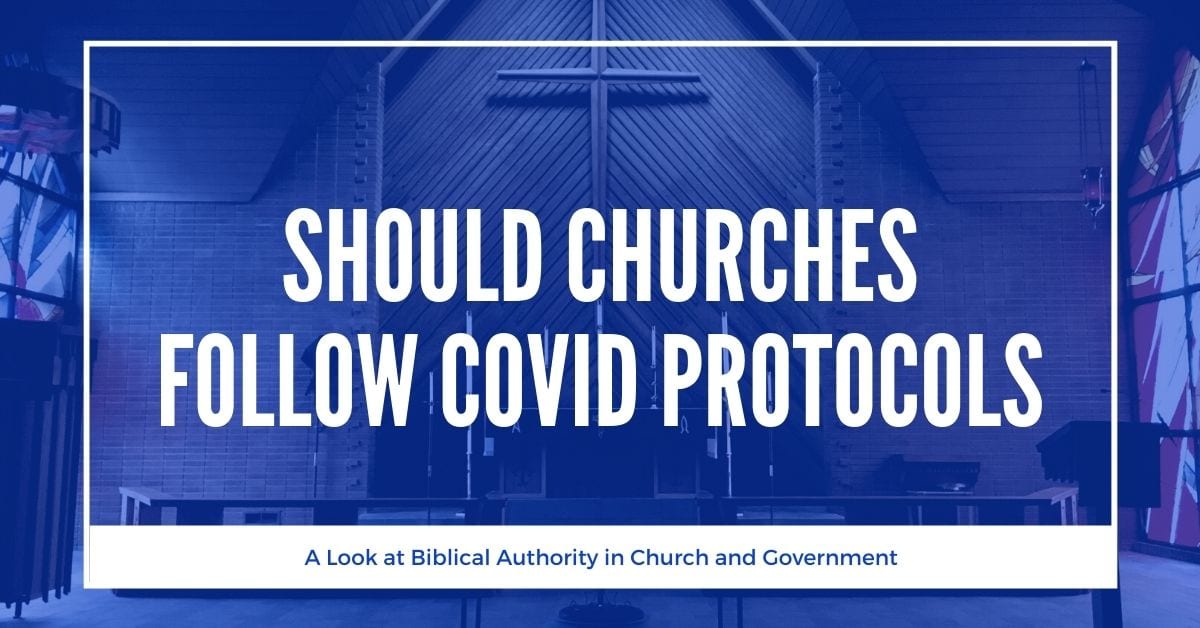
This is an excellent question. One that many American Churches have been wrestling with for more than a year. As we continue to try to do ministry and have a modicum of normalcy in the midst of the Pandemic, it’s a fair question to ask. At first, we were trying to “Flatten the Curve.” Though now, it’s hard to say if that was successful or not. Now we’ve moved beyond what feels like normal safety precautions into the realm of the bizarre. Such as wearing two sets of masks, masks under shields, air filtration systems, and the constant hypocrisy and changing of what is and is not considered “essential services.”
In the midst of all this confusion, Christians have very potent spiritual concerns. If we don’t meet physically, are we still a church? Can ministry continue even when we don’t see each other? Is Church Online really Church? And, if the government (state, federal, or local) never allows Churches to reopen, should we reopen anyway?
We’ve all been wrestling with these questions during these weeks, months, and possibly years during this pandemic. So to address these questions and provide some biblical answers, I wanted to share some truths I’ve discovered in God’s word that have truly helped me to come to my own convictions on these questions.
No Pandemics in the Bible
Before I start, I want to point out something important. There weren’t pandemics in the Bible. You aren’t going to find a verse in 3rd Timothy explaining how Pastors and Churches should handle a global pandemic. It’s a relatively modern situation. That doesn’t mean that there aren’t answers in the Scriptures; it just means we’ll be combining biblical principles and dealing with a gray area. Because of that, many God-fearing Christians may come to different conclusions based on their own priorities and convictions, which is a good and healthy thing. I’m saying all of this because if you disagree strongly with my convictions and you have a good reason for it, I want to say, “good for you!” I’m also saying it because you should search the Scriptures for your own answers to these tough questions and not just take someone else’s thoughts.
So that said, we are dealing with a gray area here. That’s one thing that has truly been weighing on me as a believer in the wider Church, and it’s that we can’t come together and recognize that we can have different convictions on this subject. I was once attacked on Social media for just implying that Christians can have different views on this. That’s how contentious this topic can be. My prayer is that we can continue to work together for the Kingdom as the CHURCH no matter what happens. Whether you agree with one side or the other. So please, if you get anything out of this, treat others, especially Brothers and Sisters in Christ, with respect and love, even when they disagree with you. That probably goes for all social media reactions, but it pains me, even more when members of different churches are angry at other churches for their decisions.
Where does authority come from?
So to try and start to answer these questions, I think we have to start talking about where authority comes from. That’s an easy one, right? Authority comes from God. He appoints governments, leaders, and states. Acts 17:26 even says He sets the boundaries that countries will have. That’s how powerful and sovereign God is!
Paul says in Romans 13:1, “Let every person be subject to the governing authorities. For there is no authority except from God, and those that exist have been instituted by God.” We’ve all read or heard that verse before, I think. It’s not news. Essentially Paul lays out in this chapter that we should follow the rule of governmental law because it is, on the whole, for our good and appointed by God.
However, there’s a lot of wiggle room in there. Paul speaks in very general terms. He doesn’t mention Rome or the Roman government. He doesn’t mention what authorities He has in mind here. And the entire passage, 1-6, is very general and addressed to individuals. It’s general in that Paul says things like “governing authorities” and “rulers are not a terror to good conduct” and “for the sake of conscience.” Together, with Paul not mentioning specific rulers, these phrases make it seem like he is speaking in a more general wisdom sense rather than a hard and fast theological principle.
We could interpret this passage in a similar light to how we read Proverbs. It’s wisdom literature full of awesome truths that are true most of the time but may not be true all the time. For example, the book of Proverbs says (Proverbs 16:18), “Pride goes before destruction, and a haughty spirit before a fall.” This makes it seem like every time we get caught in pride, and it will always lead to destruction. On the whole, that is true, but we all know someone who is incredibly prideful, and it’s actually made them more successful or lead to them getting a promotion. My point is not that this proverb isn’t true. Only to show how proverbs work. They are general life knowledge true most of the time. But not all the time in every situation. They are universal principles.
If we take this type of interpretation from Romans 13, we quickly see that Paul isn’t saying that the government is always a force for good. Or that God always wants us to follow the ruling authorities no matter what. In fact, he even says, “not only to avoid God’s wrath but also for the sake of conscience.” Is everything legal also morally right? Obviously not; many things are legal that Christians should stay away from or, at the very least, be wary of. I think it’s also clear here that Paul is saying if your conscience leads you in a way that is the opposite of governmental laws (because of the Bible), you should disobey.
Even just thinking through history, I’m sure you can come up with a few examples where a government was not out for the good of it’s people. Or even in places around the world at this very moment where it isn’t even legal to practice Christianity and worship the living God. I think that’s why Paul isn’t stating his case more strongly here.
Authority is Found in the Bible
Ultimately authority is found in God’s word, not in the constitution or a government’s laws. Every Christian would agree with that statement, I believe. One of my favorite stories is where Peter and John are thrown in Jail because they preach the Gospel. They are brought before the religious leaders and asked why they disobeyed, and they say, “should we follow God or man?”
Classic. The rulers can often be against God, and it’s our right (job even) as Christians to read the Bible carefully to see where the two have diverged and live following what the Bible says despite what the authorities of the land say. Biblical principles, first and foremost, must drive our actions and intentions before laws do. In fact, I think of laws as a fail-safe. If all I ever did was follow the law, that is about the lowest I can go to follow God. God requires much more of us than just “not breaking the law.” He requires that we not ignore the moving of the Holy Spirit within us. That is a much higher level of expectation!
Who’s in Charge Here?
With those two principles at play, I think we have to ask ourselves the question who is in charge in this situation? On the one hand, the government, according to Paul (by and large), is something God uses to restrain evil and promote well. But on the other hand, that is a pretty low standard. There’s also another question to wrestle with, and it does not get brought up enough in Churches. It’s the question of SPIRITUAL AUTHORITY.
Yep, it’s probably not something you’ve thought about before. But it’s something talked about in the Bible. It’s baked into Matthew 18. Matthew 18 is a famous passage because it lays out the foundation for biblical confrontation. But it does so in the context of the Church. We don’t have time here to really dig into this passage theologically. But I want to point at verse 19, where Jesus says, “where two or three are gathered.” This is one of those verses that has been sorely misunderstood by taking it out of context.
In context, Jesus is saying when you go through biblical confrontation and kick someone out of the church, that is God making the decision. Jesus is addressing the spiritual authority that a Church body gets from God. In Hebrews 13:17, the author says, “Obey your leaders and submit to them, for they are keeping watch over your souls, as those who will have to give an account. Let them do this with joy and not with groaning, for that would be of no advantage to you.” This is another verse addressing spiritual authority, and this author says that Church leaders have spiritual authority in your life. Not only that, but ignore it at your own peril!
I’ve been taught and believe this to mean that I am subject to the Pastors and Elders at the church to which I attend and call home. Now that last part gets tricky in our culture today because we often don’t commit to the church the way we should, and so we don’t feel as though we should be subject to them. But that is a subject for a different time.
My point in bringing this up is to say that these two circles of God-given leadership are distinctly unique and different from each other in the Bible. The Government shouldn’t be given spiritual leadership and Churches shouldn’t be creating political and financial laws for their members. Both are wrong and go against scripture. There’s one more principle at play here that we have to talk about before we can draw some conclusions and start answering the questions I asked at the beginning of this article.
We Need Each Other
If there’s one thing the Bible is crystal clear on, it’s the fact that as a Christian you NEED, other Christians. Hebrews 10:25 “not neglecting to meet together, as is the habit of some, but encouraging one another, and all the more as you see the Day drawing near.” Galatians 6:2 says, “bear one another’s burdens, and so fulfill the law of Christ.” There’s many, many more. And they all say the same thing. Christianity is a team sport. It’s never meant to be done in isolation alone, apart from the body of Christ.
In fact, Paul’s entire passage on the body of Christ is saying the same thing. That we are all part of the same body, and we need each other to survive. We aren’t all eyes, or ears, or hands and feet. We all have a part to play, and it’s only as a Church body coming together that we can accomplish all that God has for us (1 Corinthians 12:12-27).
This comes up so often in the New Testament, over and over again. Because God wants to make sure we understand how important it is, we have other believers involved in our lives that we connect with regularly and in a deep way. That is what Biblical Christianity calls us to! It’s non-negotiable.
Hard Answers
So with all of that truth as a backdrop, here are the conclusions I’ve come to. Since the Government is normally a force for good, it made sense for Church leaders to follow the authorities and do their part to help stop the spread of COVID during the early days of the Pandemic. Many, if not all, of these mandates, don’t conflict with the Bible, and so we should lead the way in following by wearing a mask (even if we don’t think we need to), washing our hands, and social distancing. I’m going to leave the politics out of this for now and focus on Biblical principles.
Other directives, though, like the way the governing authorities are treating churches as “non-essential,” should give us some cause for concern. Here the Bible is clear that Churches, for Christians, are definitely essential. That we can’t live without other believers in our lives, and we shouldn’t.
That’s where things can get hazy again. Because this leads us into waters of what is “ministry” and what isn’t. But again, I think we can let the Bible be our guide. If Biblical discipleship, restoration, repentance, preaching, fellowship, and confrontation can happen without physically meeting at the church building, then we haven’t left our mandate at all. I’d love to write an article on the Biblical functions of the Church someday, but here I’ll list a few and hope that you know where I am coming from.
That is one of the reasons I believe Church Online can truly be part of the actual church and have a true Kingdom impact and ministry. All of the ministry functions that I mentioned above can happen in a digital way over the phone, online, or even on social media at times.
Those same Church functions can also happen in a house church or a small group if they are still meeting. But not every church has enough small groups for every attendee or is equipped and able to have a thriving house church ministry to meet the needs of its people. This is where church leaders, I believe, are within their spiritual authority to ask themselves if it is time to begin to change their approach to the pandemic. Are they breaking the law? Personally, I don’t think that’s an important question to ask here.
The larger question, I believe, is they are fulfilling their God-given mandate to see that the people of the Church are spiritually growing and shepherded. Different churches and leaders may find different answers to these questions, but one thing is certain; God has given them the spiritual authority to make those decisions.










